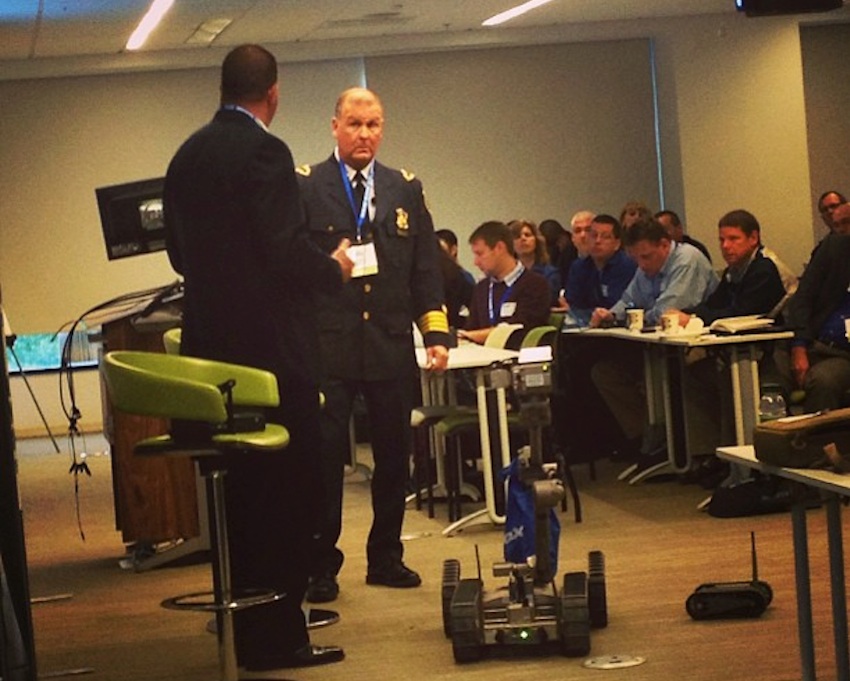Police Are Learning About the Pros and Cons of the Latest Developments In Technology
As technology advances, so does its use by law enforcement officials when responding to police calls, or dealing with certain crimes.
For the first-time ever on Monday, police from all over the country met in Cambridge to discuss how the latest emerging technologies present both problems, and solutions, for first responders, and ways police can work with the latest developments born from the sector in order to close the book on investigations, and respond to emergency situations more effectively.
The “Police Innovation Conference,” a two-day gathering in Kendall Square, hosted by the Cambridge Police Department and Microsoft, is bringing together officers from various departments around the country, including many local agencies, such as members from the MBTA Transit Police department, with innovators from the the private, academic, and public sector
“Our goal with this conference is to provide timely content, an ambitious agenda, and a unique venue,” said Peter Olson, the founder of WiredBlue and conference organizer. “By bringing together these great public and private sector speakers to share their insights, we will provide the audience with new ideas and information to take back to their agencies as they move forward with future planning for their local community.”
Day one of the conference, which kicked off Monday, brought in speakers like Mary Cummings, the director of Massachusetts Institute of Technology’s Humans and Automation Lab, and Joe Rozek, Executive Director Homeland Security and Counterterrorism of Microsoft.
Cummings took on the topic of the controversial use of unmanned devices like drones, which could be used to monitor civilian activity. “This police conference is not shying away from hot-button topics. A discussion on the emerging technology and privacy concerns of unmanned aerial vehicles is on the agenda, along with current and future roles of robots in public safety, 3D printing, and wearable technology—just to name a few,” according to a statement from the Cambridge Police Department, the agency that helped launch the inaugural event. “These panels and discussions are geared toward not only talking about technology as it currently exists, but possible uses for it, both legal and criminally-minded.”
Officers were also slated to take part in working sessions that focused on the use of “wearable cameras,” which experts attending the event said can help solve the question of why a police officer might decide to act when responding to an emergency call.
Public safety app being developed for GoogleGlass. It can deliver information to officers like maps, photos and floor plans.#PoliceInno
— Bill Bongle (@community_cop) September 16, 2013
Taser claims that in test of wearable cameras officer complaints dropped by 90%. Removes questions about why the officer acted. #PoliceInno
— Bill Bongle (@community_cop) September 16, 2013
Noting that robots are playing an ever-increasing role in law enforcement and public safety, representatives from local robotics team iRobot also made an appearance on Monday, and discussed emerging technologies coming out of their company. The session examined what robots are currently available to police departments, their capabilities, and what the future holds for robotics in public safety.
In June of 2013 Bloomberg TV named Boston the “robot hub” of the United States.
Months before taking the title, police departments involved in the manhunt for alleged Boston bombing suspect Dzhokhar Tsarnaev utilized several “tactical” machines made by the Waltham-based company QinetiQ to defuse crime scenes that they believed involved explosives, before first responders moved in to make their arrest.
The event will also look at smartphone and cloud technology, and the use of social media by police officers and other agencies. Local authorities like Boston, Cambridge, and transit Police, have consistently advanced their use of sites like Twitter and Facebook to connect with the community, and also to report crimes.
Organizers said they hope to make this series an annual event. Here is the list of departments attending this first-annual meet-up.
To follow updates from the conference, and learn about some of the technologies being presented, follow #PoliceInno on Twitter.



